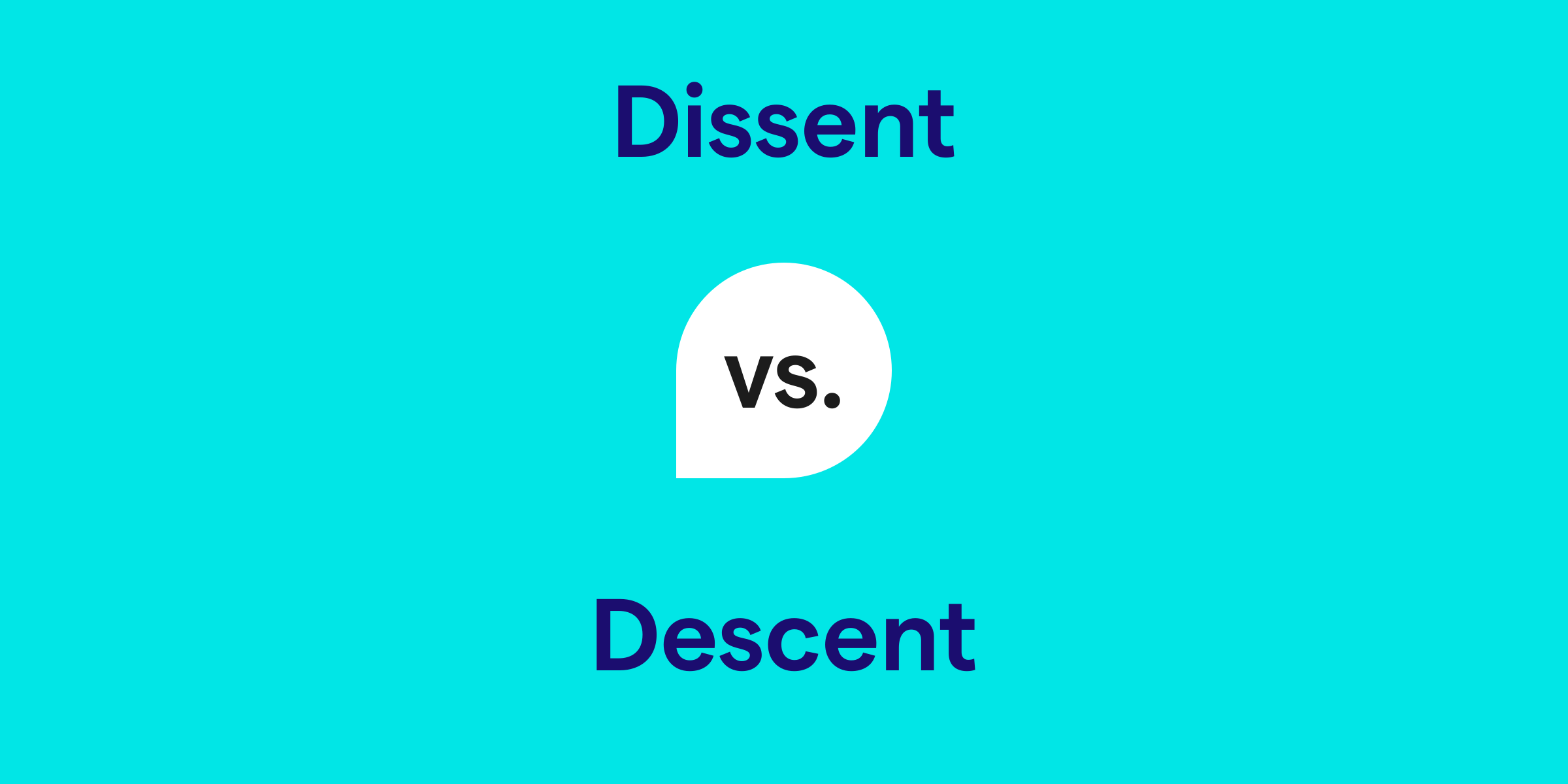Dissent vs. Descent: What's the Difference?
Dissent and descent are commonly confused words with distinct meanings. Dissent refers to the act of holding or expressing opinions that are at variance with those previously, commonly, or officially held. It is often associated with opposition in a political or social context. Descent, on the other hand, denotes the action of moving downward, dropping, or falling. It can also refer to a person's ancestry or background.

How do you use the word dissent in a sentence?
Dissent is used when referencing a difference in opinion, especially from a prevailing or official standpoint. It can be associated with individuals or groups who oppose the dominant ideology or policies, and it is also frequently used within legal contexts to describe a judge's disagreement with the majority's decision in a court ruling.
Examples of dissent in a sentence
- The proposal was accepted by the committee despite some dissent from a few members.
- The judge wrote a compelling dissent that critiqued the majority's interpretation of the law.
- In a democracy, it is important to respect the rights of individuals to express dissent.
How do you use the word descent in a sentence?
The word descent is often used to discuss a downward movement, whether it is physical, such as a person or object moving to a lower position, or figurative, such as a decline in status or behavior. It is also commonly used in the context of lineage or ancestry, referring to the origin of one’s family or ethnic background.
Examples of descent in a sentence
- After reaching the summit, the climber began her careful descent down the mountain.
- Mark is proud of his descent from a long line of skilled artisans.
- The airplane's descent was smooth, and we landed ahead of schedule.
Dissent and descent definition, parts of speech, and pronunciation
Dissent definition:
Dissent is a noun and verb. As a noun, it describes a disagreement with the majority opinion. As a verb, it means to hold or express opinions that are at variance with those officially held or commonly accepted.
Dissent parts of speech:
Dissent pronunciation:
Dissent is pronounced as "/dɪˈsent/".
Descent definition:
Descent is a noun that signifies the action of moving downwards, a downward slope, or a decline in status. It also refers to one's ancestry or ethnic heritage.
Descent parts of speech:
Descent pronunciation:
Descent is pronounced as "/dɪˈsent/". Interestingly, while spelled differently, it shares the same pronunciation as dissent.
Dissent is a noun and verb. As a noun, it describes a disagreement with the majority opinion. As a verb, it means to hold or express opinions that are at variance with those officially held or commonly accepted.
Dissent parts of speech:
- As a noun: The senator's dissent was noted in the official record of the debate.
- As a verb: The council member dissented, arguing that the decision was not in the community's best interest.
Dissent pronunciation:
Dissent is pronounced as "/dɪˈsent/".
Descent definition:
Descent is a noun that signifies the action of moving downwards, a downward slope, or a decline in status. It also refers to one's ancestry or ethnic heritage.
Descent parts of speech:
- The mountain's steep descent proved challenging for the climbers.
- In his memoir, he details his family's descent from immigrants to successful entrepreneurs.
Descent pronunciation:
Descent is pronounced as "/dɪˈsent/". Interestingly, while spelled differently, it shares the same pronunciation as dissent.
Dissent vs. descent in a nutshell
Understanding the difference between dissent and descent is key to using them correctly. Dissent involves disagreement or holding opinions contrary to the prevailing views, and it can function as both a noun and a verb. Descent, however, is a noun that relates to downward movement or lineage and shares an identical pronunciation with dissent despite the different spelling and meaning.
Get AI Writing Assistance Wherever You Type
Make sure your vocabulary is on point and every punctuation mark is in the right place, no matter where you’re working. Grammarly works across more than 500,000 websites and apps so you can improve your writing without copying, pasting, or breaking focused.

More Commonly Confused Words
Interest piqued? Pore (not pour) over other commonly confused words to help your writing reach peak (not peek) performance.